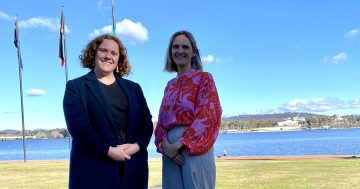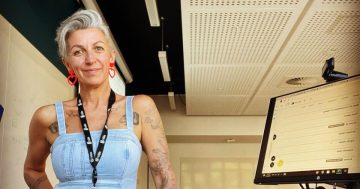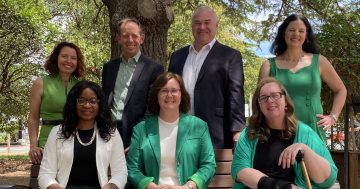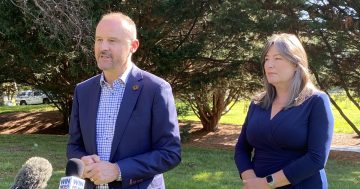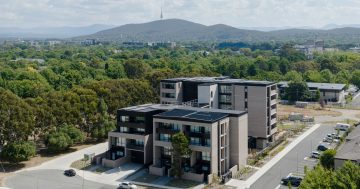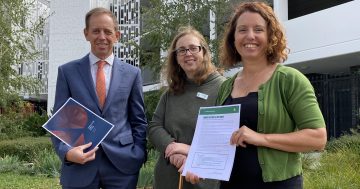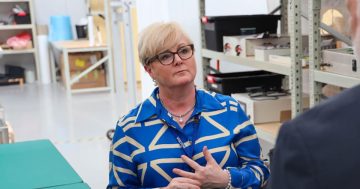
GreensSenate Candidate Indra Esguerra has gotten back to us about your questions.
Candidates, the readers of RiotACT are your voters and they have questions for you! If you’d like to answer those questions and prove you care what your voters think then email us at contact@the-riotact.com.
You can find the questions here.
1. What are your views on euthanasia?
This is a question of compassion and of dignity. With the appropriate safety measures, voluntary euthanasia would allow those with debilitating terminal illness or chronic, intolerable pain to determine when they die.
Our current legislation gives those who are terminally ill and suffering immensely; no autonomy and no relief. No doubt formulating legislation that balances the need for legislative and societal checks; with the genuine right to die with dignity will be challenging – but simply because a piece of legislation is not easy to write, does not mean it is not vitally important if we want to create a more compassionate society.
You can read our Dying with Dignity policy here: https://greens.org.au/dying-with-dignity
Of course, the other issue is enshrining the right for the ACT to have the powers to make its own laws in this regard, without the Federal Parliament intervening. (ie. Overturning the Andrews Bill)
2. Do you support a High Speed Rail Link between Sydney/Canberra/Melbourne?
High Speed Rail makes economic and environmental sense. It will boost Canberra’s local economy, decrease traffic congestion and accidents on our roads, and lower greenhouse gas emissions. The Greens have worked incredibly hard to secure a $20 million feasibility study as part of their agreement with the Government. The reports affirm what we already knew – that high speed rail makes economic sense. It will lower our transport emissions and make travel along the east coast more accessible and affordable.
We need 21st century solutions to 21st century problems. Tony Abbott is stuck in the dark ages with his attachment to roads instead of investing in more sustainable, long-term public transport solutions for Australians.
You can read our policy here: http://www.greens.org.au/high-speed-rail
I can’t wait to catch a VFT to Brisbane or Melbourne, let alone Sydney!
3. Are you comfortable with the distribution of wealth in modern day Australia?
Absolutely not.
We’re seeing the gap between the rich and the poor widen, not shrink. I believe that Government has a fundamental role in assisting the most vulnerable and the most disenfranchised. When we see social polarisation increasing, what we’re witnessing is a failure of government to adequately provide for everyone.
Newstart is a good example of a policy that fails in its objective to support people getting back on their feet and finding work. The single rate of Newstart is just 45% of the minimum wage and leaves people living well under the poverty line. We’re not going to fix the problem of inequality by giving those who are struggling so little that they can barely afford the basic like food and decent accommodation.
The Greens propose to increase Newstart by $50 per week and provide additional support to single parents. A just and fair society doesn’t allow for people to become trapped in cycles of poverty, joblessness and often social exclusion.
You can read our policy here: http://greensmps.org.au/newstart
4. Recent polling (Auspoll) shows housing affordability to be a critical issue for a majority of Australians, with 84% of respondents saying it was important to them or their families, putting housing affordability ahead of issues such as education, border security, the NBN and NDIS.
The same poll also revealed that 84% of respondents also believe that Australia is not performing well on housing affordability.
Australian Governments are failing badly on this issue of critical importance to Australians.
What would you do to improve housing affordability?
I started off life in public housing with a single mum in Weston Creek, and it is clear to me that the provision of public housing and social housing plays a very important role in the spectrum of housing options. I am a strong supporter of community housing, as I believe that housing shouldn’t just be about a roof above your head, but it is great if it can also help you feel like a part of a community.
Housing affordability means different things to different people. To people on low incomes, public or social housing is a great option (although there are terribly long waiting lists – I still blame Brendan Smyth for selling off 30% of ACT public housing in the 90s). However, there are many people in Canberra who have incomes which make them ineligible for public housing, but not high enough to afford Canberra’s high rents. This means that these people are living in the cheapest rental houses, which largely have the worst energy efficiency (ie. No insulation, etc). This means that they are paying far too much for heating and cooling, adding to their housing costs. Setting minimum standards for energy efficiency for rental houses is one very practical proposal from the Greens that the other parties have not supported, but would help housing affordability. (The more that people are spending on rent and heating and cooling, the less they are saving for house deposits.)
Homelessness has soared in Canberra over the last five years, despite Canberra being one of the most affluent cities in the Australia. This inequality should not sit easily with any of us.
The Greens have a plan to end homelessness by 2020. One in every 200 Australians are homeless, and a quarter of them are kids under the age of 18. We have committed to doubling funding for homelessness services and providing an additional 7000 new homes by 2020. Currently we rely heavily on emergency services to respond to our homelessness crisis – this is not only expensive, but it’s not a long-term solution. We have a long-term solution that provides more affordable housing and additional funding for the support services those experiencing homelessness need to get back on their feet.
5. To me the NBN seems like a great idea, can you tell me why you think it’s ace/a dumb idea.
It’s hard to see a downside to fast and affordable internet for all Australians. Connecting all Australians with high speed internet will create enormous opportunities for all Australians. Friends in regional and remote areas have told me that it would be transformative for them in terms of connecting them to a broader community and enabling them to work and do business from home. It will mean that health care, education and telecommuting opportunities will become more and more accessible and it will allow business to operate in different and innovative ways.
People I’ve doorknocked in Gungahlin have told me how happy they are to have NBN, and I have been asked why we didn’t make a TV ad from someone’s house in Gungers, to show how wonderful NBN is.
6. Do you think cyclists should be registered?!
No.
Registering bicycles doesn’t make much sense. The arguments I’ve heard in favour of bike registration are 1) bikes use roads and so should contribute to their upkeep and 2) registration would deter cyclists from breaking the road rules. I think both arguments are flawed.
Firstly, we all contribute to the construction and maintenance of our roads irrespective of whether we drive or ride on them. Cars pay registration that is in part based on their weight and potential damage they could cause – this measure applied to bikes would result in an almost negligent cost. And secondly, it’s important that all road users understand all the road rules, but registering a bicycle wouldn’t fix that. We do need a good system of road education, as there are many people who don’t fully understand the rules. I think they should be taught at school, as not everybody wants a car licence. There are also many cyclists who have multiple bikes, so I wonder whether the questioner is aiming to be able to identify the bicycle or the cyclist? That would help answer the question better.
I support making our roads safer for cyclists, pedestrians and vehicles but I don’t think bike rego is the way to go.
7. What is your position on gay marriage?
I have always supported ending marriage discrimination. As more and more of our global neighbours are recognising that all love is equal; and that all committed, loving relationships should be celebrated and recognised as equal before the law; it’s becoming increasingly clear that the two old parties are simply out of step with the world – and with the Australian people.
The Greens have been backing equality from day one. Christine Milne was at the forefront of gay law reform in Tasmania in the 80s. Sarah Hanson-Young’s first bill in Parliament was for marriage equality, and Adam Bandt’s bill to end marriage discrimination was debated in the House earlier this year – though a vote on it was blocked at the last minute.
I believe that marriage equality will happen soon. And in ten years’ time it will be one of those things, like letting women vote, that people will question why it hasn’t always been so.
8. Would you be willing to cross the floor on matters of strong personal conscience or of significant concern for your electorate?
I think this is more of a question for the old parties, whose policies don’t always align with their traditional principles, and hence crossing the floor is an issue. The reason I am running for the Greens is that my values and principles align with the party’s. I don’t have any reason to believe that I would need to ‘cross the floor’. I also believe in our party process of using consensus to build a position – in parliaments and in our party. This means that I would be proud to stand up for our positions.
However, if an issue arose which I felt strongly about, and I didn’t believe that the party position reflected my values, then yes, I would cross the floor. I’ve have always believed that it is important to stand up to government, big corporations or vested interests for what I believe in.
9. What are your views on the NSA collecting private information of Australian citizens and corporations, of the Australian government’s participation in similar programmes, and of the apparent silence of Australian politicians on the matter?
It’s a balancing act – balancing our right to privacy and freedom to communicate without surveillance; and maintaining security and safety online. At the moment, the balance is off.
It doesn’t make much sense that we have one set of rules for the internet, and a different set of rules that apply our right to privacy in our homes or at work. That’s why Greens Senator Scott Ludlam introduced the “Get A Warrant” bill which requires that law enforcement and intelligence agencies need to be granted a warrant before collecting personal information from our online or telecommunication data.
When whistleblower Edward Snowden revealed new and concerning information about how widespread NSA’s PRISM project was in America; our government went very silent. There are strong suspicions that large quantities of information may be being transferred from American authorities to Australian ones.
We are not saying that law enforcement agents should not be able to access information when trying to prevent serious crimes. But, as we would expect in any other aspect of our lives, there is absolutely no reason why they should not be made to get a warrant just as police would have to if they wanted to search your home.
10. We hear so much negativity about the opposition when election time rolls around– what three things do you consider to be positive about any of your opponents and why?
Hmm.
– They are better than Abbott
– I am pleased that there are so many candidates this election in the ACT – it makes for a richer democracy, gives greater choice to voters, and it’s great to see people standing up for what they believe in.
– It’s been a fairly clean campaign here in the ACT this election. Thanks.












